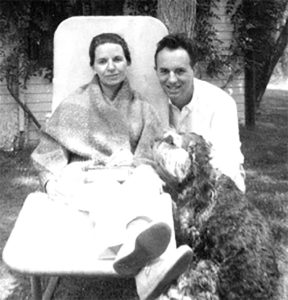Frances Edith Disner Biddle, who taught elementary school, helped her husband earn a Ph.D., raised two sons, doted on her grandchildren, enjoyed a half century of summers in Wellfleet, and helped elect Democrats from Franklin Roosevelt to Joe Biden, died on Jan. 9, 2022 at her retirement home in Bryn Mawr, Pa., two weeks after her 101st birthday.
Ms. Biddle’s health declined sharply after a fall more than a year ago, but thanks to her heroic friend and helper Barbara Davis she was able to vote in the 2020 presidential election. Well into 2021, she suggested repeatedly that something be done about the man Biden defeated.
She complained of memory loss and lamented that, unlike her wealthy mother-in-law, she hadn’t kept a diary. But she still told the story of a certain professor at the University of Pennsylvania who, 70 or so years earlier, had stopped his lecture on British writers to admonish one student, a tall, dark-haired World War II veteran: “Mr. Biddle, if you insist on disrupting the class by whispering to Miss Disner, why don’t you just go sit next to her?”

The class applauded as Randy Biddle collected his books and moved back to sit by Miss Disner.
Her marriage to Randy lasted from a summer day in 1951 until his death in 2000.
Frances Edith Disner was one of five children of Israel and Sarah (née Kahn) Disner, Jewish immigrants from Lithuania and Ukraine who spoke Yiddish and met on a Philadelphia streetcar. She grew up in Philadelphia, Detroit, and Merchantville, N.J., where she and her siblings worked in their father’s dry-cleaning and tailoring shop to help the family through the Depression. She never knew her grandfather, a rabbi who had defiantly practiced his faith in the time of pogroms, and who was said to have been taken by Cossacks on horseback, never to return. She lost an aunt and cousins in the Holocaust.
Ms. Biddle’s interest in politics surfaced early. In seventh grade, she wrote a song cheering on President Roosevelt and the New Deal (“…For in the time of the so-called depression/ You have changed … the country to a better condition…”), mailed it to the White House, and got a thank-you note signed by FDR’s aide Louis Howe. The local newspaper’s headline read, “Musical Ode to President Composed by Borough Girl.”
She attended Western College in Ohio before enrolling in night classes at Penn after the war and earning a B.A. in English. The Army Air Corps veteran she met in those classes was from a well-off Philadelphia family. When they began dating, friends called them Romeo and Juliet.
But they had much in common. Both were crazy about the New Deal, Democratic politics, Penn football games at Franklin Field, postwar writers like J.D. Salinger and Saul Bellow, and teaching. She taught at a boys’ school in Philadelphia before becoming a mom; he went on to become an English professor at Drexel, Rutgers, and Widener universities. They vacationed on Cape Cod at his parents’ Wellfleet summer home.
The marriage merged a family persecuted by the Nazis with one that helped bring them to justice. Randy’s father, Francis Biddle, was Roosevelt’s last attorney general — and chief U.S. judge at the Nuremberg war crimes tribunal in 1945-1946. She loved recalling how her future husband had said nothing about his father’s prominence till she demanded to know why, during a meet-the-parents outing in Atlantic City, passersby walked up to shake his hand and say, “Hello, Mr. Attorney General.”
She was also fond of quoting the friend who spied her and Randy at a movie theater and teased, “There go the poor but intellectual Biddles.”
In the 1960s, ’70s, and ’80s, when they lived in Bala Cynwyd, Pa., Ms. Biddle threw kaffeeklatsches for candidates like Pennsylvania’s first Jewish governor, Milton Shapp, and Rita Banning, Montgomery County’s first female commissioner. Her son Steve, who is active in politics and regional planning, remembers her rallying voters for a Democratic congressional candidate who narrowly won the swing district where Steve and his wife, Lynn, live. In 2008, Ms. Biddle organized Democratic women in her retirement community, Beaumont at Bryn Mawr, to get out the vote for Barack Obama.
A lover of drama and playwriting, she pitched in for a time with Plays For Living, a national group that used theater to confront family and societal issues. She had so many devoted friends from her summers in Wellfleet that her family called them her Mafia.
When her son Dan, a longtime Philadelphia Inquirer reporter and editor, lost his wife of 35 years, Cynthia Roberts, to pancreatic cancer in 2016, Ms. Biddle became one of the largest donors to the Cindy Fund. Established in Roberts’s memory, the fund helps disadvantaged families enroll children in the West Philadelphia preschool Roberts once led, the Parent Infant Center.
Ms. Biddle lived to see Dan remarry last October, to former New York Times reporter Sara Rimer. They staged their tiny, masked ceremony in the courtyard of Ms. Biddle’s retirement community so that she could attend. Barbara Davis helped her gently into a wheelchair. Her son Steve was best man. Her granddaughter Ellery was emcee. Her great-granddaughter, Cleo, 20 months, was the flower girl. Ms. Biddle waved her bouquet for a photo and remarked of the unusual wedding, “Leave it to the Biddles.”
She died three months later.
Her beloved husband, Edmund R. Biddle, predeceased her by 21 years. Her survivors include sisters Marion Zieman and Marjorie Newman; sons Stephen and Daniel; grandchildren Jonathan, Ellery, and Elizabeth; and great-granddaughter Cleo.
A delayed Zoom Shiva is planned for Sunday, Feb. 27, her late husband’s birthday. Donations in her memory may go to the Cindy Fund, the ACLU, the NAACP Legal Defense Fund, the Wellfleet Historical Society, and the Friends of Herring River.



